Text
Task 2 Article: Education in a pandemic, lack of a routine.
Education in a pandemic: lack of a routine
By Kathryn Morrison and Daniel Tihn
According to Prof. Charmaine Gauci, Malta is yet to reach it’s peak. This simple statement speaks volumes of what can be expected in not only our future as a country, but what world we will be living in through the coming months. Businesses may go bankrupt, unemployment will be on the rise, global health might take a hit as many are forced to stay indoors, and the dawn of a new recession is right around the corner. However, what about those who, in an age of technology and social media, live in the online space?
Although most students would love more free time to binge watch Netflix, the reality is that many are struggling with the new change. As lectures move to virtual platforms, life becomes a nightmare with assignments, and exams being shuffled around, with the due dates changing constantly. No one could have truly prepared for an event like this, but due to the rapid change many are beginning to feel left behind.
When confronted with the urgency of shutting down schools, actions had to be taken quickly. By prioritising the immediacy of the decisions over the consistency between them, many issues are going unsolved. When asked about how the University of Malta is handling online communication and teaching, 1st year student Elisa Gatt had this to say:
“[It] depends on the lecturer of the particular module rather than the school. Out of nine modules: two do online lectures; one does online lectures and also sends us the recording; four send us recorded lectures, one sends us a set of notes with corresponding voice recordings; and another hasn’t sent us anything.”
Explaining the current situation in a simplified manner is confusing in itself, let alone basing one’s future education around the convolution. Many students are having to juggle this new system whilst also getting to grips with reality themselves. Even when it comes to the simple things such as video platforms, some lecturers prefer to use Zoom where others opt for Microsoft Teams or Google Meet. Having to jump from one to another between back to back lectures, all on different spaces is not only inefficient but is making it that much harder for students to find some breathing room.
It is not only University students struggling with the new system. Secondary school students are finding it difficult to keep up with the new workload while also finding ways to keep their sanity. A student who is currently in Form 2 was asked how they are handling this newfound stress, and simply replied that they are not. Due to a lack of online lessons, they spoke about the self-doubt that accompanies their work without proper guidance and the problems at having to organise everything and schedule their work.
The ‘blame’ cannot be pinned onto one party, as schools are trying their best to keep their students informed and on the right track. Meanwhile, teachers are trying their best to cope with the changes in tandem while also doing extra work for the sake of helping their students. With everyone struggling to regain normality, the only way forward is for all of us to support one another, to keep ourselves informed, and to focus on making it to the other side.
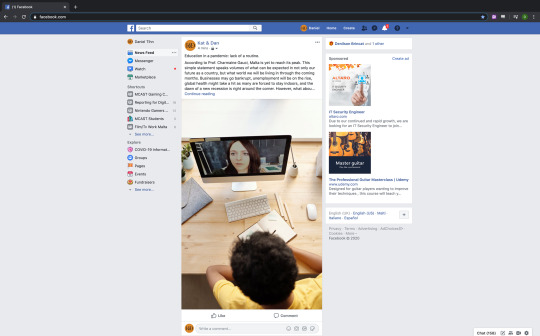

0 notes
Text
Task 2 Reporting for digital media idea generation and research
Task 2 Idea Generation: Kathryn Morrison and Daniel Tihn
The question: How is COVID-19 changing daily life?
IDEA 1: Interviewing media companies for an insight in Coronavirus’ effect in the creative sector.
Since our course is Creative Media Production, it would be interesting to discuss how media companies are dealing with the current situation. We could find local companies like Maka Visuals, TVM, Lovin Malta or FreeHour. Additionally, we could ask foreign companies if they would be willing to provide a statement or sit for an interview. This way we would hit all demographics but also every facet: news, entertainment and informational pieces.
Some questions to ask potential interviewees:
Has it impacted creativity negatively or positively? Would projects be postponed, or would an alternative solution be found to keep clients happy? What problems would it pose for future projects? How would the company move forward to maintain momentum?
IDEA 2: How are teachers and students coping with the current situation? An insight into the current educational change.
We would interview teachers and students both locally and abroad with a series of questions designed to be applicable for all, as the situation hits close to home and therefore everyone has an opinion.
We can interview two areas of life: primary and secondary teachers, as well as students from sixth form, primary, and secondary. If possible, a foreign teacher or students from different countries would be beneficial for an insight into how coronavirus is affecting the rest of the world.
Education is a vital building block for society, an essential, which renders these questions important and relevant for all those who watch the feature.
Perhaps getting rid of the typical ‘question and answer’ format, when it comes to those, we can interview who live in our household: we could have parts of the video with the interviewer and interviewee to be across a long table. This way, the visual presence of social distancing is upheld as it permeates into the essence of the video: how can education move forward in this situation? It is the question on everyone’s mind.
Idea Justification
After discussing it as a team, Daniel and I (Kathryn) have come to the conclusion of doing a news report following the struggles teachers and students are having at continuing their teaching/education. This decision was not made out of whim yet have a few justifiable reasons.
Firstly, as students, this topic is near and dear to us as not only do we find the theme interesting, but we are living through it as we speak. This news feature will not only tell a story, but it will indirectly tell our story as students and the struggles that have been thrown at us. Secondly, this feature will tick a few boxes when it comes to CINNPUT: the story shows conflict between the students, the teachers, the system, and the situation; will hopefully shed some new light on the current situation; centres around Malta and the troubles happening here; and now is the time to write and film pieces centred around COVID-19.
Finally, a major point that helped us choose this topic is that we, as a team, personally know many teachers and students which enables us to perform first-hand research without the use of online conferences and, when it comes to Task 3, the interview can be done face to face. By knowing these teachers of different levels (including a headmaster and an English teacher who lives in America which can bring some foreign context), we will be able to have multiple sources from which to quote and gain knowledge from a multitude of angles. Even when it comes to the gathering of photographs and b-roll, it may be possible to capture some ourselves instead of finding all our sources digitally (with the proper consents in place).
Article Research
Below is a list of articles we examined as a team and used to construct our idea, the flow of our writing, and the pacing of the story. They also helped inform us on what to include vs exclude in our story. With that said, most of our research will be first hand through interviews.
· https://www.bbc.com/news/education-52145351
· https://www.theguardian.com/australia-news/2020/apr/06/education-ministers-to-discuss-how-to-ensure-year-12-students-finish-school-this-year-coronavirus
· https://www.theguardian.com/education/2020/mar/20/what-should-uk-students-do-during-the-coronavirus-outbreak
· https://www.cnn.com/2020/04/05/us/us-coronavirus-teachers-school-closures/index.html
· https://www.courier-journal.com/story/news/2020/03/28/conoravirus-kentucky-school-closures-stop-usual-student-teaching/2906646001/
· https://www.cnbc.com/2020/03/26/how-coronavirus-changed-college-for-over-14-million-students.html
· https://www.quebec.ca/en/health/health-issues/a-z/2019-coronavirus/stress-anxiety-and-depression-associated-with-the-coronavirus-covid-19-disease/
Article Medium
Before writing an article, a publishing medium first needs to be chosen. Where a piece will be viewed changes the style of writing, language, format, and content drastically as each medium has its own audiences. For our piece, we chose Facebook.
As a social media platform, Facebook has the farthest outreach as a lot of people from all demo- and psychographics use it on a daily basis. When compared to other social media platforms (such as Instagram), there are more users to target and hit with content on Facebook than anywhere else. When it comes to the actual targeting of the content, Facebook’s algorithm for sponsored posts and how it reaches new audiences is very efficient and easy to track those statistics. Although we will not be posting the article and sponsoring it, we are very familiar with Facebook’s system and the business side of the website, making it an obvious choice for us as a team.
Facebook’s wide net is a major advantage for our piece as we are targeting multiple audiences across multiple ages and interests, making the platform perfect.
Writing for Facebook changes the content of the piece, especially when it comes to the flow. When writing for a newspaper, one needs to more informative and direct whereas Facebook is a post, meaning the writing leans towards a style that flows from one paragraph to another. The register of the piece is also affected by the medium, with ours going to lean towards a more casual approach than references us (the writers) and the audience (this feels natural as social media is based on interactions between individuals instead of a third person writing style).
Most Facebook posts have some form of visual media accompanying the post (photos or videos). For our post, we will include an image to accompany the writing (although the text is the main focus), but if this piece were to be released in conjunction with the video in task 3, then they would be released together with the video at the bottom of the article.
Generally, posts on social media platforms would include hashtags to help spread the piece around but since Facebook has its own sponsoring system and algorithm, we wouldn’t include any hashtags. By being able to target the interests of our audience, we wouldn’t need to use hashtags which have the possibility of making the article look ‘tacky’ (the same effect applies to emojis).
Meeting: 2nd April
BASE IDEA: To Interview multiple teachers and students of different levels to see what the situation is at their schools and how they are continuing their education
Students Levels:
2 x Primary (1 going to secondary)
2 x1 Secondary
2 x 6th Form
Bala Uni/MCAST students
Teachers Levels
1 Kindergarden
1 Primary
1 Secondary
2 x Headmistresses (maybe)
1 Foreign English Teacher (Austin)
What do we need?
for task 2: the criteria:
Identify topical concept - (maybe) In our essay we can justify why our topic is topical in a mini intro?, this could accompany our identification of the type we're writing (so either informative, or educational or else entertainment).
identify medium and method of presentation for news report
prepare digital media report for implementation showing evidence of process used
produce an authentic written news report showing evidence of authenticity
Checklist
◦ DOCUMENT: justifying why we chose the topic, the type, the idea-generation
◦ RESEARCH A NEWS STORY: something similar to the topic and following the same field
◦ WRITE THE NEWS STORY
◦ RESEARCH: websites used, references, interview subjects and the medium, transcript of the interview
◦ PLAN INTERVIEWS AND LOCATIONS
Final list of Questions
1. How is the school handling this ‘home schooling’ situation?
a. This is to get a general overview on how the school is enabling students to continue their studies and lecturers/teachers to remain in contact with their class/es
2. What possible benefits have you encountered from online classes? Whilst completely different from the norm, how can online learning change education for the better in these trying times? And what about the disadvantages?
a. When it comes to education, how has the teaching/learning process been affected? Has the quality gone down when it comes to lessons and lectures? Has being at home helped your studies/workload?
3. How are you as a teacher/student coping with this new stress? What are you doing to combat the cabin fever? How is the school helping teachers/students handle this newfound stress?
a. For example, how are teachers reaching out to students and being more accommodating when it comes to assignments and exams?
4. Apart from online lectures, how are you ensuring that your teaching/studying is still kept up to standard? Are you sending/receiving any supplementary material outside of these digital classes? What do you think about that?
N.B. When the same point has multiple questions, these wouldn’t be asked at the same time but instead would be used to either clarify the main question or to help the interviewee answer.
Final list of questions - students
1. How is the school handling this ‘home schooling’ situation?
2. Whilst completely different from the norm, how can online learning change education for the better in these trying times?
3. How are you as a student coping with this new stress? What are you doing to combat the cabin fever?
4. Apart from online lectures, how are you ensuring that your studying is still kept up to standard? Are you receiving any supplementary material outside of these digital classes?
Final list of questions - teachers
1. How is the school handling this ‘home schooling’ situation?
2. Whilst completely different from the norm, how can online learning change education for the better in these trying times?
3. How are you as a teacher coping with this new stress? What are you doing to combat the cabin fever?
4. Apart from online lectures, how are you ensuring that your teaching is still kept up to standard? Are you sending any supplementary material outside of these digital classes?
People Asked
· James Morrison (Form 4 student, going on form 5 in September; attends St. Michael)
· Alice Morrison (Year 6 student, going on form 1 in September; attends St.George Preca Paola Primary B)
o Alice is in year 6, therefore their syllabus was finished before the pandemic. Regardless of whether or not it happened, all they would have done in class would have been revision, therefore no online lessons are happening.
· Ruth Morrison (Secondary School teacher; teaches at St. Thomas More)
· Elisa Gatt (Bachelor of Commerce, 1st Year)
· Faye Darmanin (B. Psy., 1st Year)
· Lexi Manduca (B. A. in European Studies and International Relations, 1st Year)
· Carla Camilleri (B. Sci. in Applied Food and Nutritional Sciences, 1st Year)
· Alexandra Tihn (Form 2; attends Our Lady Immaculate)
· Hannah Gatt (B. Sci. in Communication Therapy, 1st Year)
· Gillian Darmanin (Primary School Teacher; teaches at Chiswick House School)
- Sean Bacica (B.A in Creative Media Production, 2nd Year)
Answers:
James Morrison’s answers (Form 4 student, going on form 5 in September)
1. I wake up at around 10 o’clock, later than normal, I have breakfast and then my mother makes me study or do homework, which I am reluctant to do as there is no motivation at all to study for exams which I have to sit for after this period. I am handling it badly, as this situation feels more like a holiday rather than school. Due to that, I just want to play on my phone or play video games all day as I would when on holiday.
2. I have only had a few online classes, as the majority of the focus for my year is on online homework. However, for the few times I did have online classes (at the beginning) made me realise that I prefer it. Online learning has the advantage of being more flexible, which for people my age is a benefit as we don’t like being told what to do. So, having the ability to pick the time and place of our work is a plus. I feel more comfortable using technology as it is more hands-on rather than just listening to the teacher, I can take notes at my own pace and I can pay attention better from the comfort of my own home.
3. Ultimately, I miss my friends and playing football with my club, as well as seeing my grandparents as I go and stay with them every weekend. At the moment, I am trying my best to adapt my activities of before the quarantine to online activities. For example, my catechism group are meeting online, and my family and I are getting takeout every Saturday so we can have a ‘’get together’’ and talk about how we’re handling the situation, it cheers me up a lot. Luckily, we have a garden and I can practice football and exercise outside which is super important to me as football keeps me sane.
4. I have been using the foreign language app Duolingo to keep practicing my German. At home, my mum sits with me and helps me study as next year I will be in form 5, so right now it is important that my grades do not slip. I am also receiving worksheets which we have to print, work out and send a picture for some lessons, others have no given us anything. Other teachers are putting videos up on youtube of lessons which we have to watch, and then fill out a form afterwards to make sure we understood the material.
Alice Morrison’s answers (Year 6 student, going on form 1 in September)
N.B Alice is in year 6, therefore their syllabus was finished before the pandemic. Regardless of whether or not it happened, all they would have done in class would have been revision, therefore no online lessons are happening.
1.I am handling it well, Home-schooling works for me because since I am at home, my mum walks me through my revision slowly and therefore I have more attention and help rather than everything being fast due to having to finish the syllabus in time. Also, I am happy about not having benchmarks because it removes the pressure I had before.
2. Online learning is more fun in my opinion because since it is all online, there is the possibility of sharing maths games for example or videos which personally keep me interested and help me learn better. A big one is that I feel less pressure working from home, in the classroom it is harder to keep up and I feel like online learning gives me more room to learn from my mistakes.
3. I am coping well, I feel great because I feel like I am introvert. This does not feel stressful to me, I feel much more relaxed when I am at home in comparison with when I was physically at school. I feel stressed and sad when I think of how I have not seen my grandparents in a long time, so I have been phoning them for often. Sometimes I feel a bit lonely, but I keep in contact with my friends from school by video-chatting them and also make new friends online.
4. I have had no online lessons as my syllabus has been long finished. My mum gives me revision exercises to do every day as extra work, as well as makes me read in English and Maltese to go hand in hand with the worksheets I receive from my teachers. The downside is that without being in class, I have to wait longer for my teachers to correct my homework which makes the learning process a bit slower. We also have quizzes on our school tablet which actually motivated me and kept me feeling like I want to learn because it was competitive.
Ruth Morrison’s answers (Secondary School teacher)
1. We were given to go ahead to do what we deem fit for the sake of our students; we can either do online lessons, send worksheets or find other methods depending on the subject. Some of my colleagues sent emails, used the state school platform ‘’My School’’ to post homework or video links, but we were given the email addresses of all the students in case we preferred to contact them directly individually. On the end of the school’s assistance, we were given webinars teaching us how to use Microsoft Teams so that all staff members are acquainted with the software needed. SMS’s were sent to the parents to encourage student participation and to make sure everyone is aware of the resources. However, not every student is participating. The student participation is actually really low, which is concerning for us teachers. The students who previously did not put much effort into working have diminished incredibly in regard to their effort now, but the students who showed interest are maintaining this.
2. It can be used as tool for the better for integration of internet resources such as videos which students seem to like and keeps the students who are visuals learners to pay attention and review for better understanding. It could be useful for revision for the most part, but then we have to be careful as online learning removes the barrier and leads to lack of routine or ‘’boundaries’’ as some students do not pay attention to school hours and expect responses instantly. I feel the majority of the benefits are for primary students as it allows the parent to be present for the learning experience, but for secondary school students the benefits lie only for note-taking (as some teachers speak quickly and students need to write everything down) or for reviewing purposes. Games, videos, learning websites with music and graphics are all great for the modern student as it is more engaging to many in comparison to reading from books. We show all these things in class, but with online learning everything is able to be reviewed again and again. Ultimately, I feel online learning should be used in conjunction with real-life learning rather than instead of, as everything is better when balanced.
3. The webinar about how to use Microsoft teams and watching many youtube videos of how to use the software given to us did alleviate a lot of the stress I had, as well as teaming up with my colleagues, keeping in contact and sharing information regarding what we can do to move forward is a great help. I post notes, worksheets, video links, everything I can to provide the same experience, but the response from students is not massive, but since I send answer sheets as well that may be because they are marking their work themselves in adherence to the sheet I sent. Communicating with my colleagues and opening up to them helps me with the cabin fever situation, we help each other and offer support with technical problems or general issues. We send funny videos and ‘’memes’’ to cheer each other up as well. I am revising my German, as before I did not have time to brush up my skills and now I can; it keeps my mind engaged. I am basically doing everything I had no time to do before, such as decluttering.
Ironically, I am home schooling my children which feels great as I love teaching and it comes second nature to me, but it is hard when they do not want to work due to the demotivation effects of the quarantine.
4. I teach geography, and all us geography teachers created a specific ‘’team’’ for conversation with each other and keeping up the standard of the geography lesson, but I have not given any online lessons as it is not necessary for my situation. Since geography is not a main subject, I am aware of the fact that I may not have the same pressure as a maths or English teacher for example, as in school I would only see them once a week. I am therefore doing the best I can by sending extra videos, notes and anything interesting I feel would benefit them. I am also open for emails and respond to questions outside digital classes. I have found myself in the position of resending old notes as many students had left their notes in their lockers at the time of the school closure, as well as textbooks, therefore I simplified some notes as well due to them not having a textbook explanation.
Sean Bacica's answers (MCAST ICA 2nd Year student)
1. I am taking it day to day, planning out assignments as they come along and follow the instructions from my lecturers about how to proceed
2. Most of the lectures I am having during these times are 1 on 1, so the increase in personal attention helps with the progress of more challenging tasks
3. I feel I am coping quite fine with the stress, virtually meeting with lecturers and fellow peers often helps! When I feel trapped inside, I try to take a short drive or take my dog out for a short walk especially since the weather is so nice
4. Generally it is just online lectures that are keeping me and most of my peers in line with our goals and standards. External notes that wouldn't normally be supplied are being supplied which helps us to study when we aren't in said lectures
Elisa Gatt (Uni student):
1. Depends on the lecturer of the particular module rather than the school.
Out of 9 modules
- 2 do online lectures
- 1 does online lectures and also sends us the recording
- 4 send us recorded lectures
- 1 sends us a set of notes with corresponding voice recordings
- and another hasn’t sent us anything
I don’t mind the recorded lectures, however depends on the quality of teaching, some just send us a recording of them reading a power point which is quite useless.
However, I prefer recorded lectures over live lectures as one can pause to take notes, and listen to them in their own time.
The handout and voice recording lecture really fit the subject (statistics) well also.
Personally, I’m managing to cope with the lectures, however the main problem for me is exams. There is a deadline for the 17th for them to tell us what is happening with exams for the respective modules. However I feel like knowing if the exam will be assessment or assignment based will help to actually start studying.
2. It allows students to work in their own time. However this can also be a bad thing for students who aren’t very good with time management and organization.
3. Surprisingly doing well. I’ve been going up to my brothers office on weekday mornings to do work, so I can split my uni life and home life. And on weekends I don’t do anything school related.
This has really helped as I’m not spending 24/7 on my desk at home and I’m wasting less time.
4. Some send us power point presentations, while others recommend reading chapters of certain textbooks.
However one lecturer based his entire module on a textbook which isn’t being printed anymore, and can’t be found online. And doesn’t send us any power points, expecting us to take our notes from this book which can’t be found anywhere. Especially with the current situation.
For my statistics lecture we have a set of notes, and also a set of tutorial sheets to ensure we all understand.


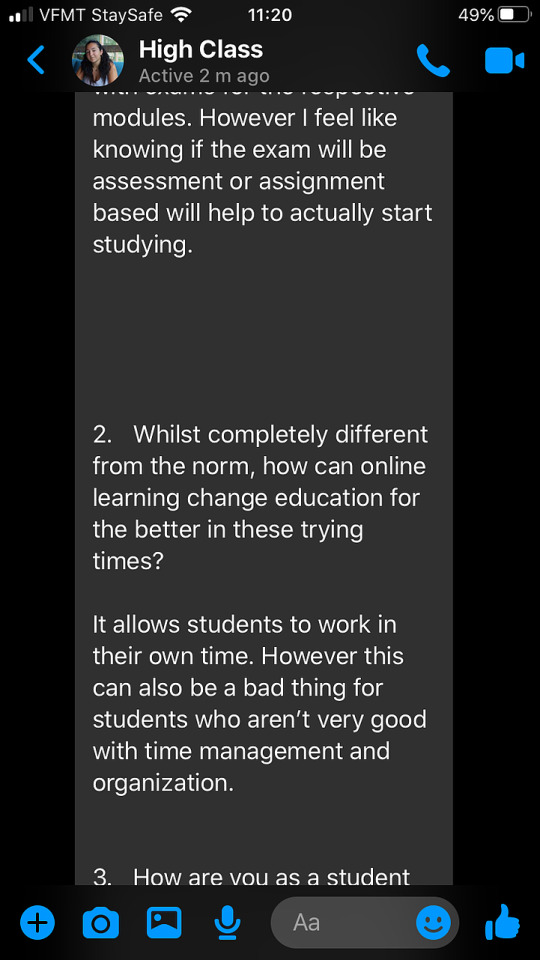
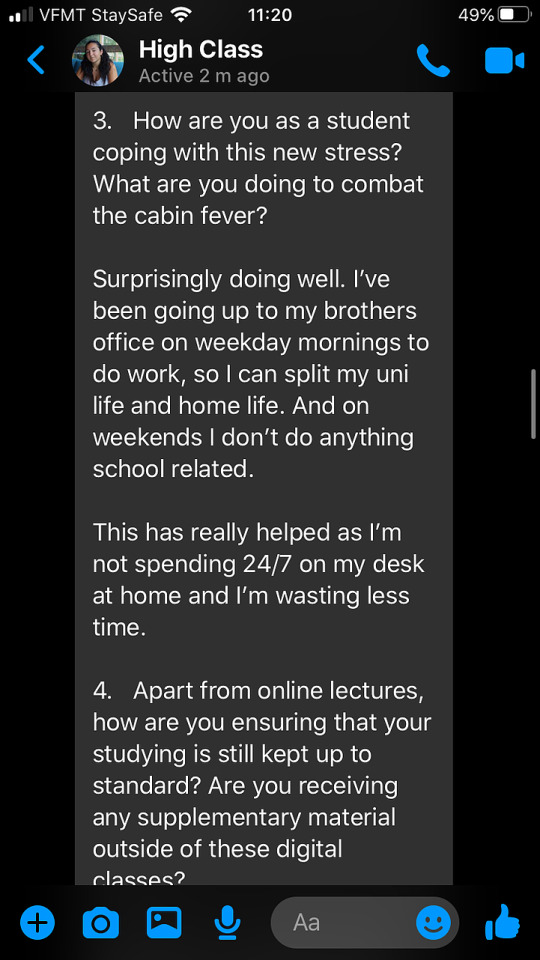
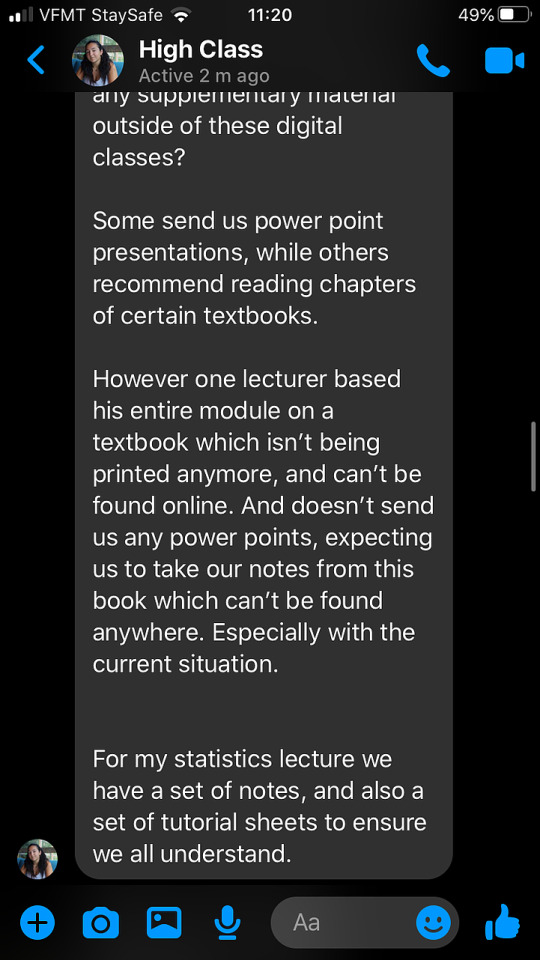
Faye Darmanin (Uni Student, part time):
1. Quite well; I have online lectures for both of my units, and each of them upload the PowerPoints of the topic right after the online lecture ends.
The only issue I have is that the university is taking too long to tell us what the situation is for exams, not allowing us enough time to prepare.
2. This gives students more time with studying and note-taking.
3. I’m not doing anything to combat it, as since I only have 2 units the stress of school is quite low.
4. We are receiving the uploaded PowerPoints of each topic, but they are uploaded during normal face-to-face lectures as well, so nothing extra is being sent.
Lexi Manduca (Uni Student):
1. Quite well; I have online lectures for both of my units, and each of them upload the PowerPoints of the topic right after the online lecture ends.The only issue I have is that the university is taking too long to tell us what the situation is for exams, not allowing us enough time to prepare.2. This gives students more time with studying and note-taking.3. I’m not doing anything to combat it, as since I only have 2 units the stress of school is quite low.4. We are receiving the uploaded PowerPoints of each topic, but they are uploaded during normal face-to-face lectures as well, so nothing extra is being sent.
1. Most give us online live lectures on zoom. Some send us pre-recorded ones. Some lecturers just send us the power points and readings which is not at all an ideal way to learn.
2. It could encourage lecturers to record the lectures and upload them after the lecture so that students can go back and re-listen to anything they might not have understood during the lesson. This might encourage students to miss lectures so stricter attendance would need to be applied to combat this.
3. Recently I've found the best way to tackle being home all day is to spend as much time as I can out in the sun (in the balcony not actually out of the hosue).
4. We do receive the occasional podcast/ additional readings but mostly I'm keeping up with my studies through researching for and carrying out assignments
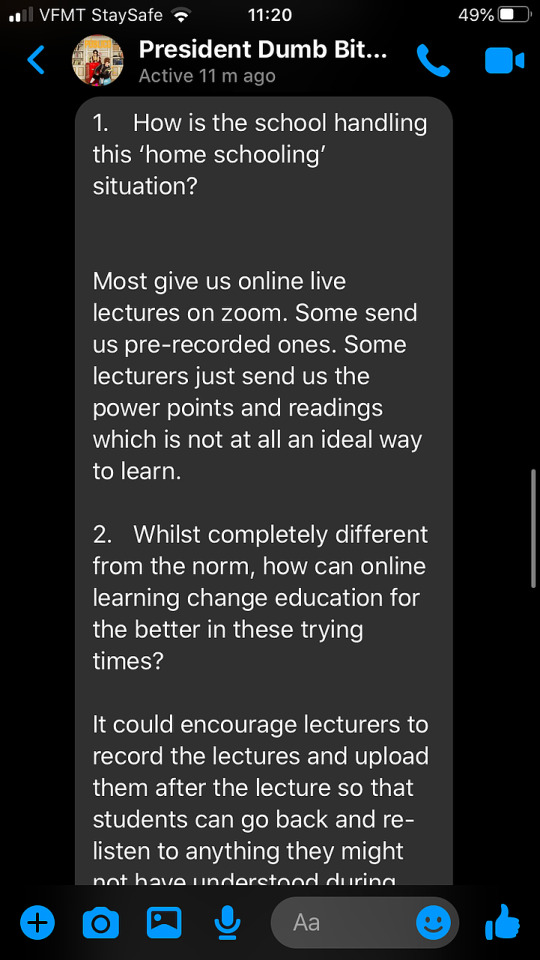

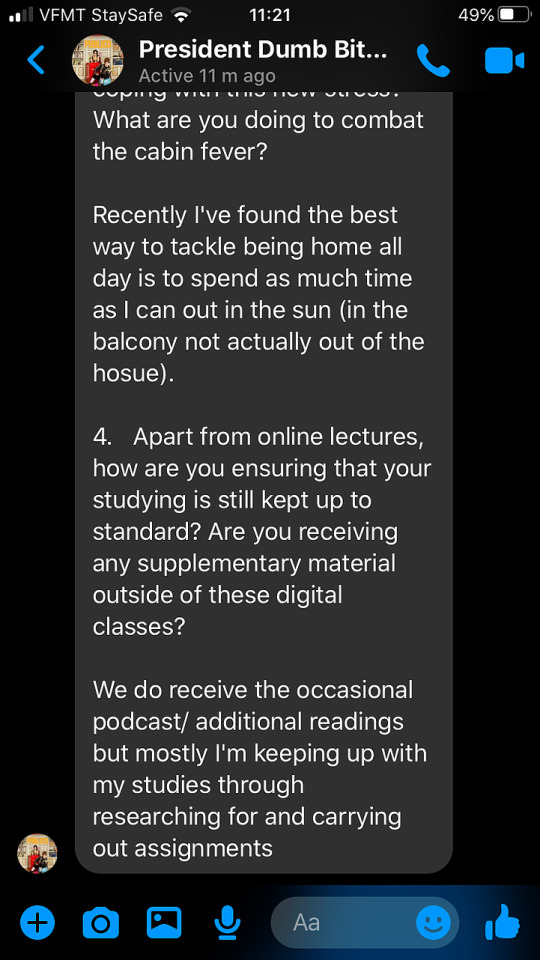
Carla Camilleri (Uni Student):
1. We’ve resorted to online lectures via Google Meet or Zoom. My faculty was pretty efficient with regards to continuing with lectures as normal however have barely given us any feedback with regards to what will be happening for exams.
2. Online learning can offer different ways of interaction between the lecturer and students as well as between the students themselves which wouldn’t normally be explored in a normal classroom such as through Groupwork on Google Docs or using videos on a more regular basis to initiate discussions. Online learning also makes learning more flexible and customizable. Lectures are generally recorded so can be accessed later on as a method of revision, if one needs clarification on a subject matter or can’t join the lecture in real time. The workspace can be altered by the student as desired to fit their mode of learning and comfort.
3. I’m making sure to attend all my lectures in real time as well as catching up on class notes to make sure i do not fall behind on work. I’m also making sure to communicate as much as possible with my lecturers to remain up to date on the exam and assignment situations for my units. Balancing learning with my hobbies also helps to combat stress, turning my focus away from continuous learning allows my brain to reset and relax.
4. Our lecturers have provided us with all the powerpoints of their lectures. They’ve also provided us with books for further reading and videos which help in providing a better understanding of the topics being covered. This all makes studying easier as we’re given multiple sources for making notes which are referred to when exam season begins.
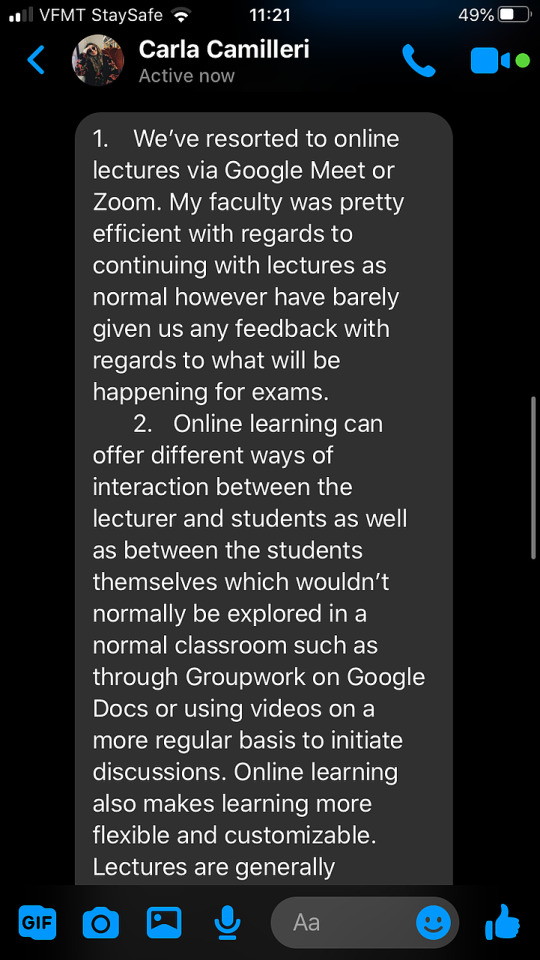
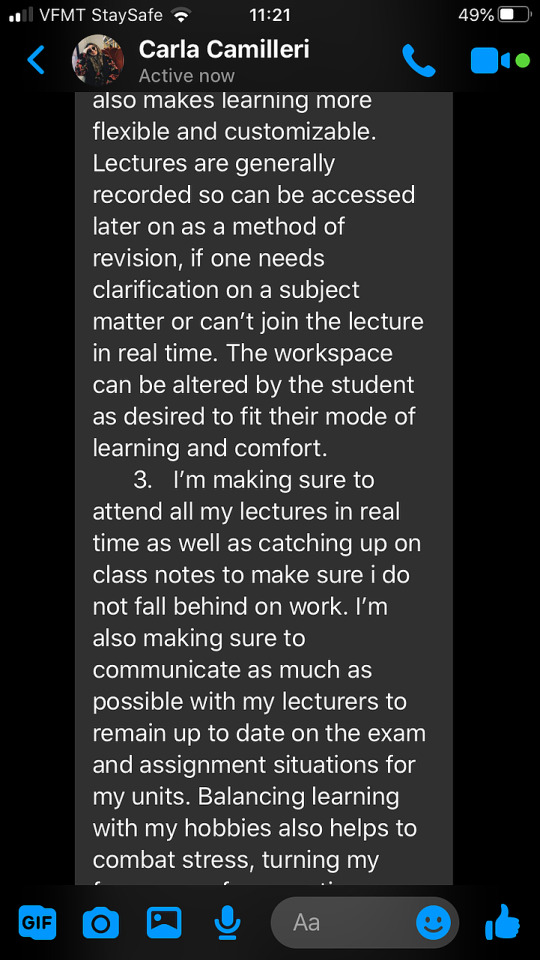
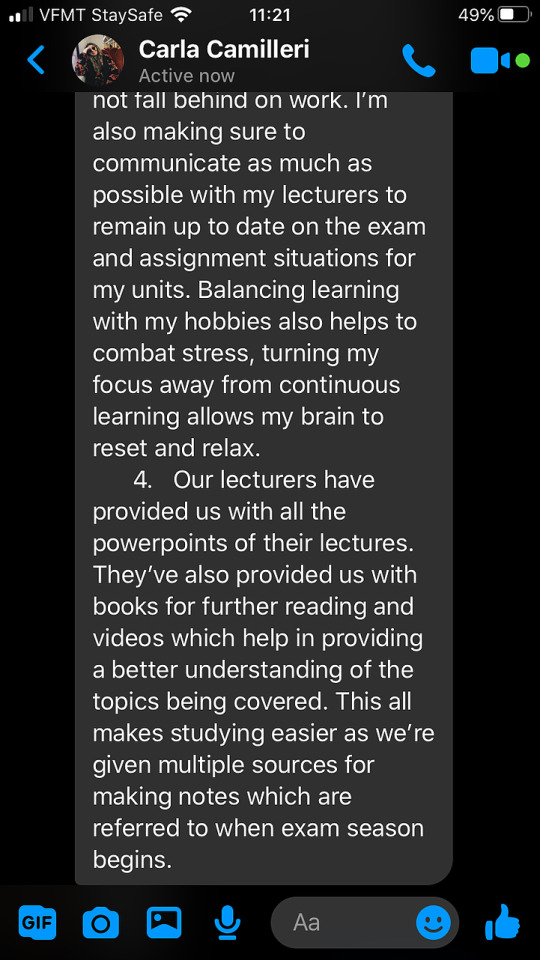
Alexandra Tihn (Form 2)
1. My school is handling the home-schooling situation by sending me homework and assignments every day while I'm away from school, I dont have online classes but I still have papers and work. It's hard to keep up on everything that the school sends us since they send us a lot at once it gets really confusing for me, but it isn't that bad since I made a schedule.
2. I think it’s a good way to do work while I'm away from school, but I don't think it's the best thing we could do while we are away since they send us double the work and it's getting really hectic.
3. I’m coping with all the work but the stress comes along with it straight away, having to see where I can get things printed or seeing when the deadline is since it's all messy and wondering if what I'm doing is correct without an actual explanation from the teachers. I think I'm handling staying inside really well, especially since we have technology now which allows me to communicate with my friends so I don't feel totally alone, although it does make me feel very lonely at time when I just want someone to talk to or to hug etc.
4. Well given the fact that I don't have lectures the only way I can know if I'm keeping up with the standard of studying is by doing as much of the work I can as possible before they leave the school website because of deadlines. The teachers sometimes sends me and everyone as a whole class some papers with notes and some power points but it's hard to keep up since sometimes they send us work and then the next day send us the answers so I don't really have time to do the work sometimes.
Hannah Gatt (Uni Student):
1. Under these circumstances I think the school is doing all it can to aid its students in any way they can. This being said, some lecturers are clearly putting in more effort than others however overall, the university seems to be helping students adjust to home schooling very well. My only issue at this point in time is regarding the examination period and having no idea what is going to happen. Out of the 11 study units I have, I only know for certain how 3 of them are going to be assessed whilst the others are keeping us in the dark which is extremely unfair.
2. I think online learning has proven the importance and value of face to face interactions with teachers and lecturers that simply cannot be replaced. However it has also shown that regardless of the circumstances, there is always a method through which education can take place which is important for everyone to keep in mind.
3. To be completely honest I am growing slightly restless as I miss interacting and socialising with people. However, im trying not to get too overwhelmed with the situation since I know that everyone is in the same predicament. I’m personally trying to keep myself busy mainly by working on assignments but I also try to pass time by reading, playing playstation ect…
4. Some lecturers are being extremely helpful and giving us extra material in order for us to understand better yet at the same time some lecturers aren’t taking into account how stressful this situation is for us and won’t even answer our emails regarding queries on our work/assignments. Besides all this I feel it is up to us students to not get lazy and continue working by ourselves for online lectures are not enough to help us to get through our end of year assessments.
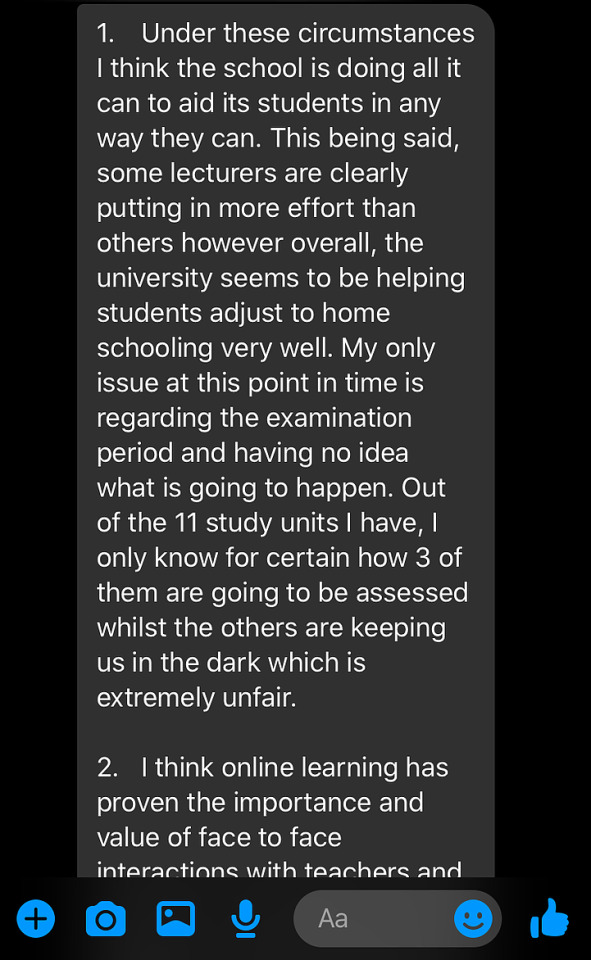

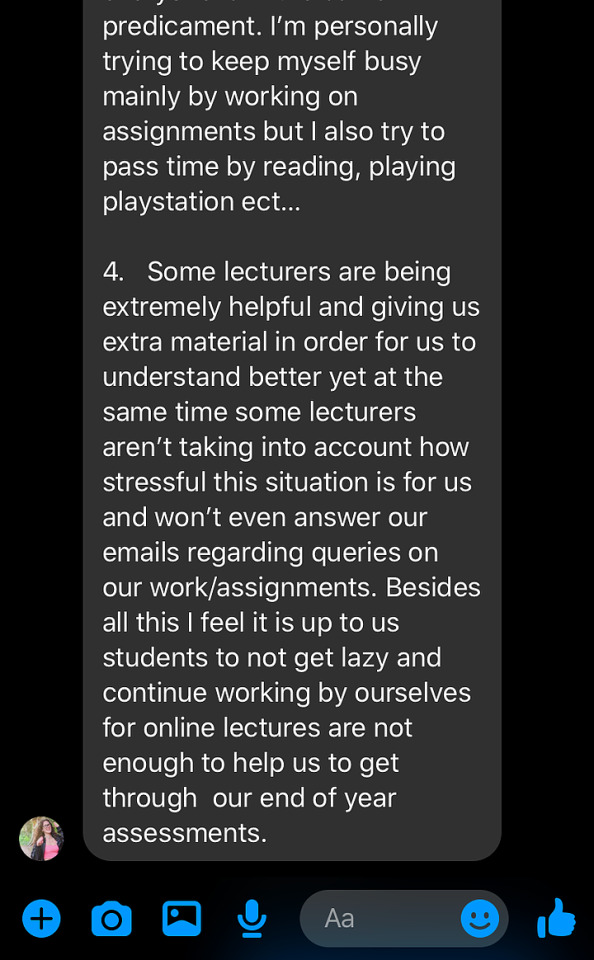
Gillian Darmanin (Primary school teacher)
1. The school I am currently employed with has primarily followed & complied all instructions issued by the government regarding the closure of the school. The school head and assistants have communicated with parents via email on how they were planning to assist their pupils. They in turn through consultation & collaboration with all level leaders and all teachers implemented an instruction strategy for the current situation.
2. In online learning the social interaction with the pupils is quite limited. However, having said that more and more sites have made their resources free for parents and teachers. Many have also included a section called ‘home learning’ providing videos with clear explanations as well as worksheets and answers in an attempt to provide clear instruction on the topic at hand.
3. I am communicating & collaborating regularly with other teachers through Microsoft teams and through phone calls. Trying to keep a regular routine every day and regular yoga!
4. Even though I teach in primary school, the senior leaders have taken the decision that for online teaching each teacher in a level will be subject teaching. Also, teachers have been paired up to work on lesson preparation as a team. Focusing on a particular subject helps to hone your skills in a particular area.
Supplementary material like worksheets & online libraries have been set up to encourage further consolidation of topics learnt. Also encouraging pupils to record themselves giving presentations and or reading so continuous assessment can be continued in this unprecedented situation.
N.B. Those without screenshots were asked verbally and then the answers were transcribed.
Video Format
Video Flow:
The video starts with the interviewer opening with a short monologue, describing the current situation and introducing the topic at hand (situation with students and teachers). This will lead into a series of audio clips from students from different institutes and levels of learning, each answering the same question but always adding something to the story (a new perspective).
Back to the interviewer explaining some of the students’ opinions on how the future will present itself. Then cut to more snippets of audio from the students about how they think the future will pan out (this would concern how they feel and how they think this will be resolved. We will not be writing the script for the interviewer’s sections until after the interviews themselves so we have all the information nat hand before committing ourselves.
The music should be on the mellow side while also having poppy undertones. This would be able to create a relaxing tone to the piece while also giving it a vibe appealing to a bit of a younger demographic.
The video (and article) will target a wide audience as it will not specifically be aimed at any particular demographic yet will be targeted to those who have an interest in education, the current situation, and schooling. It will also attract a general audience as it will inform the average reader on the happenings of students.
Video Locations/Footage:
· People’s homes via webcam.
· Footage found online (below are examples and resources)
· B-roll shot by Kathryn and Daniel (For example: students entertaining themselves, a lecturer teaching a lesson [without showing students], screen recording of online class)
Audio:
· https://www.epidemicsound.com/
o We have an account
Online Assets/Footage:
· https://www.youtube.com/embed/hIkCmbvAHQQ?rel=0&autoplay=1&cc_load_policy=1
· https://www.pexels.com/search/videos/students/
· https://www.pexels.com/search/videos/online%20work/
· https://www.pexels.com/search/videos/at%20home/
· https://pixabay.com/videos/search/students/
· https://pixabay.com/videos/search/online/
· https://www.youtube.com/watch?v=q7euX2P-Mwk
· https://www.videezy.com/people/37310-businesswoman-checking-product-on-stock-online
· https://www.pexels.com/video/woman-having-a-video-call-4053047/
· https://www.pexels.com/video/busy-woman-working-with-her-laptop-and-smartphone-3251808/
· https://www.pexels.com/video/a-disappointed-woman-keeping-herself-busy-3709513/
TASK 2 ARTICLE (also in separate blog post)
Education in a pandemic: lack of a routine.
According to Prof. Charmaine Gauci, Malta is yet to reach it’s peak. This simple statement speaks volumes of what can be expected in not only our future as a country, but what world we will be living in through the coming months. Businesses may go bankrupt, unemployment will be on the rise, global health might take a hit as many are forced to stay indoors, and the dawn of a new recession is right around the corner. However, what about those who, in an age of technology and social media, live in the online space?
Although most students would love more free time to binge watch Netflix, the reality is that many are struggling with the new change. As lectures move to virtual platforms, life becomes a nightmare with assignments, and exams being shuffled around, with the due dates changing constantly. No one could have truly prepared for an event like this, but due to the rapid change many are beginning to feel left behind.
When confronted with the urgency of shutting down schools, actions had to be taken quickly. By prioritising the immediacy of the decisions over the consistency between them, many issues are going unsolved. When asked about how the University of Malta is handling online communication and teaching, 1st year student Elisa Gatt had this to say:
“[It] depends on the lecturer of the particular module rather than the school. Out of 9 modules: 2 do online lectures; 1 does online lectures and also sends us the recording; 4 send us recorded lectures, 1 sends us a set of notes with corresponding voice recordings; and another hasn’t sent us anything.”
Explaining the current situation in a simplified manner is confusing in itself, let alone basing one’s future education around the convolution. Many students are having to juggle this new system whilst also getting to grips with reality themselves. Even when it comes to the simple things such as video platforms, some lecturers prefer to use Zoom where others opt for Microsoft Teams or Google Meet. Having to jump from one to another between back to back lectures, all on different spaces is not only inefficient but is making it that much harder for students to find some breathing room.
It isn’t only University students struggling with the new system. Secondary school students are finding it difficult to keep up with the new workload while also finding ways to keep their sanity. A student who is currently in Form 2 was asked how they are handling this newfound stress, and simply replied that they are not. Due to a lack of online lessons, they spoke about the self-doubt that accompanies their work without proper guidance and the problems at having to organise everything and schedule their work.
The ‘blame’ cannot be pinned onto one party, as schools are trying their best to keep their students informed and on the right track. Meanwhile, teachers are trying their best to cope with the changes in tandem while also doing extra work for the sake of helping their students. With everyone struggling to regain normality, the only way forward is for all of us to support one another, to keep ourselves informed, and to focus on making it to the other side.

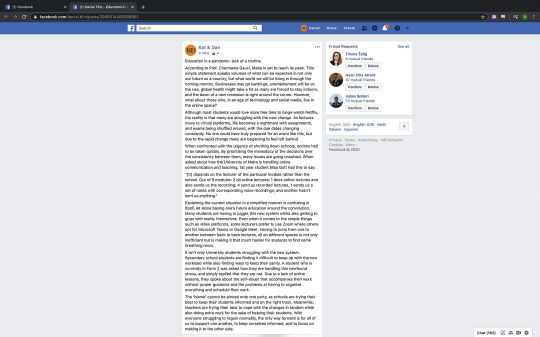
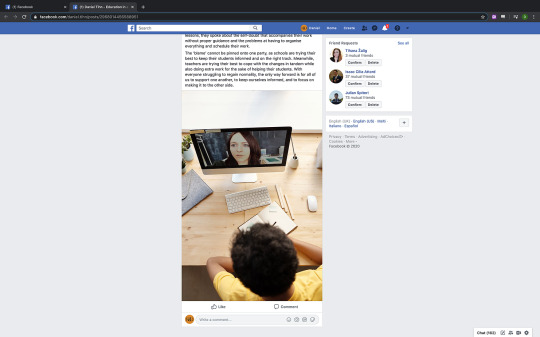
0 notes
Text
Task 1: Reporting for digital media
Reporting for digital media task 1 – Identify and research a news story to report on chosen digital media Research: The articles analyzed (informative news):
Article 1: ‘’Anonymous ‘doctors’ support abortion’’ on Newsbook https://newsbook.com.mt/en/maltese-abortion-laws-are-violation-of-human-rights-ngo/
Article 2: ‘’Doctors For Choice: Maltese Medical Professionals Band Together To Advocate For Safe Access To Abortion’’ on Lovin’ Malta
https://lovinmalta.com/news/local/doctors-for-choice-maltese-medical-professional-band-together-to-advocate-for-safe-access-to-abortion/
B:
In terms of narrative construction, Lovin’ Malta’s article follows an easily legible structure by starting with the lead which hooks the reader and encapsulates the scope of the article: ‘’An anonymous group of independent medical professionals have banded together to form a group advocating for the safe access to abortion in Malta.’’ In comparison, Newsbook provides the sentences ‘’A new NGO called Doctors for Choice (DFCM) has been set up to lobby for the introduction of abortion in Malta. The press release sent by the organisation was not signed by anyone.’’ In regards to treatment, the Newsbook article is much more negative with diction such as ‘’not signed by anyone’’ and ‘’could not verify…doctors or not’’.
The tone is doubtful with Newsbook’s article, whereas Lovin’ Malta’s article is positive and informative. Lovin’ Malta’s article introduces the subject, the organization: ‘’Doctors for choice’’ through two quotes: the first quote stating their mission, accompanied by a second paragraph which explained their reasons firmly and through testimonies by other women and reference to the legal climate. This method holds the reader’s attention due to proximity and usual subject matter, eventually provoking discussion. Underneath the paragraph, Lovin’ Malta places a photo which redirects the reader to their Facebook page, an effective method of promotion and an easy way to share information.
The photo displays diversity and feminism, with ‘’absolute’’ words such as ‘’should’’, following the rule of threes which states that statements and subjects are more interesting when they come in threes. The photo is minimalistic in design and easy for the mind to process, using checkmarks to represent future goals. The world health organization logo in the bottom right denotes reliability and the reader feels obliged to listen to the message. A stock photo of a pro-choice rally in Ireland is inserted and captioned as ‘’stock photo’’, with the words ‘’not a walking womb’’ written on a sign carried by a woman, which may shed light on the message being pushed by Doctors for Choice, with the intention of highlighting their agenda through a similar event (another pro-choice rally).
On the other hand, Newsbook did not label their stock image, which sends the wrong connotations in regard to the thought put into the article and the quality, as a journalist should always cite their sources. A survey is utilized in both articles, however in the case of Lovin Malta’s article, the survey details were not disclosed. ‘’Surveys shown’’ does not offer any means to research the said survey properly, however, the conclusion that the survey came to (that both political parties are against abortion) was confirmed through use of the hyperlinks ‘’ PN Leader Adrian Delia has repeatedly suggested’’. In this case, the survey findings’ conclusion was explained through another article. The Lovin’ Malta article ends with a powerful statement with the insertion of a hyperlink, stating that the president George Abela said that he will resign before signing abortion into law. This type of statement encourages debate and perhaps shock in readers as such a decision has news value.
The press release by Doctors for Choice is inserted at the end along with their logo redirecting to their Facebook page, giving the reader a second opportunity to visit their page. In regard to quality, the Lovin’ Malta article trumps the Newsbook article as there is more attention paid to enclosing detail, exposing the subject’s mission statement and actual reporting of the issue. The title names the organization and the mission statement, instead of the vague and rather ‘’accusing’’ and disapproving tone that Newsbook utilizes. One can see the difference when comparing: Maltese Medical Professionals Band Together To Advocate For Safe Access To Abortion versus ’Anonymous ‘doctors’ support abortion’’. Lovin’ Malta calls them ‘’medical professionals’’ and Newsbook calls them ‘’anonymous ‘doctors’’’, with doctors in inverted commas implying a sarcastic overcast on the term.
Additionally, Lovin’ Malta calls for ‘’safe access to abortion’’ whilst Newsbook writes ‘’support abortion’’ which has different connotations, ‘’safe access’’ has more positive connotations as it encourages safety and reduction of mortality (regardless of subject matter), and ‘’support abortion’’ drives different conclusions to mind in comparison with the former. It is interesting the note the structure of Newsbook’s article, as there is not much depth to the writing, with the information on surface level. Newsbook, in this article, would report news, and then interject their opinion discreetly through hyperlinks. The journalist wrote a paragraph consisting of quotes said by the organization but would instantly ‘’counter’’ these quotes by use of hyperlinks to other articles which negatively respond to the quotes, revealing a true agenda. One can say that the older and religious Maltese audience has a negative outlook on the topic, as one would gather from the comments they leave on articles about abortion. Therefore, the role of the journalist in this case was to ‘’reassure’’ the audience that they do not hold a view in favor of abortion.
In comparison, Lovin’ Malta’s article which did not reveal any bias but informed appropriately with multiple social media links and reference to the organization. Most of the article was quoted from other sources and did not feature emotional adjectives towards the subject. Culturally, the ‘’share on social media’’ buttons on articles are used abundantly when it comes to the topic of abortion as it always generates response over social media. Therefore, journalists treat the topic carefully and stay away from it all together if possible; hence Newsbook writing in a vague manner and pushing their agenda against the topic. Writing positively about the topic, or provoking discussion, leads to negative comments which override the positive due to the ‘unusual’ nature of the topic.
Lovin’ Malta’s intention was to inform the public and advertise Doctors for Choice, which was accepted by the intended audience: young people, due to their use of journalese and younger writers, but rejected by the older generation who slammed the article.
C.
The article ‘’Anonymous ‘doctors’ support abortion’ was written by Fr Joe Borg, PhD, a university of Malta lecturer and winner of the Gold award for journalists. Whilst Fr.Joe Borg is a qualified source, he is not a reliable source in regards to this topic as he fails to be neutral by writing with a negative agenda and withholds information which pertains to the 5 W’s. The first indication of bias is from the author’s title of ‘Fr’, as Catholics cannot be pro-choice (Catholic Answers, 2014), which provides the reader with the indication that the article may lean heavily towards an anti-abortion stance and in that case would picture the topic and the news surrounding it with a different angle, mostly a negative one.
The author writes for Newsbook. The website in itself is authentic and written by professionals in their respective fields, however, exudes conservative bias in the way that ‘Lovin Malta’ is a news outlet of liberal bias. As Newsbook holds a predominately conservative agenda and approach, this requires the author to be liable to the negative agenda that surrounds abortion in Malta, and in the case of the article: show distrust towards doctors who support abortion in Malta as a result of the stigma. Placing the word ‘doctors’ in the title inside quotation marks is derogatory and aims to discredit the doctors by creating an aura of distrust and mockery. The doctors which the author was referring to are qualified and registered, but by looking at the title one does not receive the same reassurance. The negative agenda pertaining to abortion is clear as traditional society aims to silence all debate and flow of information surrounding the topic, therefore the author claims that he could not verify the names of the ‘’anonymous doctors’’.
However, the names of the administrators were found on their online website along with photos on their Facebook page. Doctors for Choice’s Facebook page was founded on the same day the article was written, therefore it is Newsbook’s journalistic duty to update their article with more information and photos which were available on all Doctors for Choice’s platforms (Doctors for Choice, Malta, 2020). The wording of the title ‘’doctors support abortion’’ creates internal conflict as it insinuates that a ‘’good’’ doctor does not support abortion and aims to shame an individual for thinking otherwise due to the connotations of this phrase and the tone surrounding it. The article solidifies its stance through a survey completed by University of Malta students over whether students are for or against legalization of abortion. The results favored the article’s agenda and initially impact the reader by hitting close to home, where out of 733 students, 58.4% of those were against legalization of abortion in Malta. On the other hand, 41.6% were in favor. Furthermore, Newsbook came to the conclusion that university students are against abortion. However, Newsbook included a hyperlink: Majority of university students oppose abortion – KSU survey which stated that 11,000 students took part, therefore the conclusion reached is invalid as only a minuscule fraction contributed, hence one cannot say that 733 out of 11,000 is the majority.
Additionally, due to the stigma surrounding the topic and the lack of education without negative bias, one cannot assume that all survey responses are accurate and educated. 2019 was a historical year in Malta, where the topic of abortion was debated and addressed by the president, politicians and young people (such as the pro-choice rallies in September. The news value rests on the unusual nature, the proximity of it all and the prominence of the topic, as Malta is the only EU country to ban abortion in all circumstances, therefore opening a discourse is not normal for the country and has never evolved to this degree. (Cacciottolo, 2018).
The article was published in May, rendering it two months after an important event where president George Vella stated his stance against abortion where he made a ‘’pledge to respect life from start to finish’’ in his first speech after oath. It is interesting to note the persistent use of ‘’Pro-abortion’’ and ‘’Pro abortionists’’ as a depiction of liability. ‘’Pro-abortion’’ and ‘’Pro abortionists’’ are applied more than once in lieu of ‘’pro-choice’’, the proper term. This choice was calculated and purposely done to demonize the pro-choice movement by placing their topic of interest, abortion, to the forefront. This practice is apparent in the sensationalist hyperlink ‘’Pro-Abortionists say they are passionate about reproductive rights’’, intended to garner a strong reaction where ‘’pro-abortionists’’ is the first thing one sees which solidifies the ‘’mocking’’ aura. This leads to another Newsbook article which utilized an unattractive picture (not posed, taken in the spur of the moment) and furthers the agenda conservative, right-wing news sources hold.
References
Anonymous ‘doctors’ support abortion - Newsbook Borg, J. (2019). Anonymous ‘doctors’ support abortion - Newsbook. [online] Available at: https://newsbook.com.mt/en/maltese-abortion-laws-are-violation-of-human-rights-ngo/?fbclid=IwAR0IxDjERrs3c7jTSpUm_PpeIrX8GnktR40QjlyWG7PnRkt8eKBIr_KL-C8 [Accessed 17 Mar. 2020]
Pro-Abortionists say they are passionate about reproductive rights - Newsbook Debono, S. (2019). Pro-Abortionists say they are passionate about reproductive rights - Newsbook. [online] Available at: https://newsbook.com.mt/en/pro-abortionists-say-they-are-passionate-about-reproductive-rights/ [Accessed 17 Mar. 2020].
The Journalists' Questions: 5 Ws and an H ThoughtCo. (2020). The Journalists' Questions: 5 Ws and an H. [online] Available at: https://www.thoughtco.com/journalists-questions-5-ws-and-h-1691205 [Accessed 17 Mar. 2020].
'Fake news' isn't the problem — mainstream news with an agenda is TheHill. (2016). 'Fake news' isn't the problem — mainstream news with an agenda is. [online] Available at: https://thehill.com/blogs/pundits-blog/media/307783-fake-news-isnt-the-problem-mainstream-news-with-an-agenda-is [Accessed 17 Mar. 2020]
Cacciattolo, M. (2018). Malta sets stage for abortion debate. [online] Available at: https://www.bbc.com/news/world-europe-45900815 [Accessed 17 Mar. 2020].
Why Catholics Can’t Be Pro-Choice Catholic Answers. (2014). Why Catholics Can’t Be Pro-Choice. [online] Available at: https://www.catholic.com/magazine/print-edition/why-catholics-cant-be-pro-choice [Accessed 17 Mar. 2020]. Reproductiverights.org. (2020). [online] Available at: https://reproductiverights.org/sites/default/files/documents/European%20abortion%20law%20a%20comparative%20review.pdf [Accessed 17 Mar. 2020].
0 notes